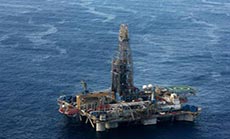
The Gulf’s Gas Conspiracy Against Lebanon

By: Jean Aziz
Al-Akhbar, October 9, 2013
Lebanon may be edging closer to extracting the large gas reserves located in its territorial waters in the Mediterranean, but there are forces working diligently to make sure that doesn't happen.
 To many, it appears as if Lebanon is merely one or two legal steps away from becoming a gas producer, but they may find getting there nearly impossible, given the regional forces arrayed against it. These forces aim to either dominate the country or tip it over the edge, as some government sources describe the attempts to prevent Lebanon from exploiting its gas.
To many, it appears as if Lebanon is merely one or two legal steps away from becoming a gas producer, but they may find getting there nearly impossible, given the regional forces arrayed against it. These forces aim to either dominate the country or tip it over the edge, as some government sources describe the attempts to prevent Lebanon from exploiting its gas.
Lebanon's gas file, for example, is firmly in the hands of the Gulf's political opponents locally, and they are ones likely to benefit most from any progress toward completing the process of exploration and drilling.
It all started on March 13 when the Lebanese Ministry of Energy expressed great optimism at the interest shown by major oil companies to participate in the bidding process for exploration rights in Lebanese waters. Some go so far as to say that the Najib Mikati government's resignation on March 22 was not purely coincidental, nor was the consequent deadlock over the electoral law and other resignations.
This did not prevent the Energy Ministry from issuing a list the following month of companies eligible to enter the bidding process, including 46 oil companies, among them the top seven from the US, Russia, China, with virtually none from the Arab Gulf. This is what prompted the likes of Druze leader Walid Jumblatt to insist that current Energy Minister Gebran Bassil cannot return to the ministry in any future government.
Nevertheless, the bidding process continued at the end of April, with company representatives submitting exploration licences, thus setting Lebanon on a course to becoming a petroleum-producing country starting in March 2014, when the bidding process would end and the actual work of extracting the gas would begin in earnest. This was seen as a great provocation and orders were issued that this process must be stopped at all costs for political, economic, and geopolitical reasons.
Government sources concede that the Gulf countries' concerns may very well have to do with issues beyond Lebanon, like the Syrian crisis, without ruling out internal consideration. Lebanon's gas file, for example, is firmly in the hands of the Gulf's political opponents locally, and they are ones likely to benefit most from any progress toward completing the process of exploration and drilling. The oil sheikhs could barely contain themselves at the site of the British foreign minister meeting with Lebanon's minister of energy during his last visit to Lebanon.
The Gulf's antagonism toward Lebanon has only intensified as prospects of a political resolution to the Syrian crisis have increased, prompting them to take a series of steps, from arming takfiri groups in Syria and Lebanon to threatening to expel the thousands of Lebanese expats who work in the Gulf, not to mention their efforts last summer to abort Lebanon's vital tourist season by warning their citizens against traveling here for security reasons.
The Gulf's success in undermining Lebanon's efforts to become a gas producer will not only affect their political opponents, it will be a deadly blow to the country as whole, for even before anything is extracted, the national economy will experience a much needed boost in creating jobs, for example, and set Lebanon on a course to deal with its ballooning debt, which today eats up 40 percent of the annual budget.



